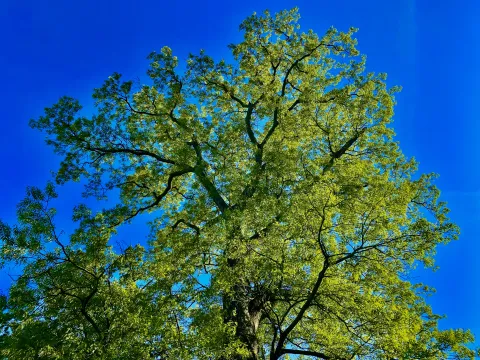Do the World a Favor In March

Trees provide multiple benefits and worth planting a few.
By Steve Roark
TN Dept. Agriculture, Forestry Division
These days it’s easy to get on an environmental guilt trip. Drive your car to work, you pollute the air. Buy a box of crackers, you end up with a box and wax paper to add to the landfill problem. Run your heat pump, add carbon dioxide and support global warming. But, in honor of March being Arbor Month in Tennessee (April for Kentucky and Virginia), let me suggest doing something to feel good about, one with numerous pluses: plant a tree. Why so good? Let me enumerate
Good thing 1: Looking good. Every human admires a stately tree in the landscape, so much so that they are willing to pay for it. A 10-inch diameter white oak in good health in a residential yard will add around 1700 bucks to the value of the property (price varies with size, species, and location).
Good thing 2: Trees are cool. That same 10-inch diameter tree has the cooling ability to offset a sizeable air conditioner. If one tenth of your house is shaded by a tree from a brutal July sun, it could save you around ten dollars per month in electricity.
Good thing 3: Breathing easy: Our 10-inch tree (if healthy and vigorous) will take in 75 pounds of carbon dioxide and give off 50 pounds of oxygen. The average human (at rest) needs around 400 pounds of oxygen per year. If you exercise a lot, you need more trees. More important is the absorption of carbon dioxide (called carbon sequestration) and converting it to wood. This helps offset the greenhouse effect thing.
Good thing 4: Pass the paper please. We Americans are good at consuming, using on average around 700 pounds of paper products per year. Up quite a bit with the coming of Amazon shopping. If you must consume, it’s at least a plus to consume something that can be recycled and grown back.
Good thing 5: Getting wild. Planting the right tree in the right spot will benefit the many wildlife species that depend on trees and the forest for food and cover. A large oak will produce on average 2000 acorns per year. Deer, turkey, grouse, blue jays, and squirrels are just a few species that depend on oaks for food, especially during the critical winter months.
I think you get the picture. For help in selecting trees to plant, contact your local nursery, Extension Agent, wildlife agency, or Forestry official.
- Log in to post comments